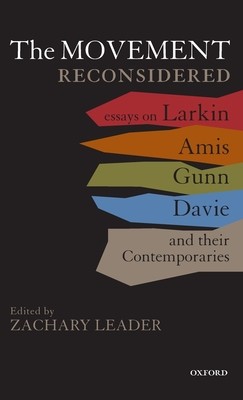
- We will send in 10–14 business days.
- Author: Zachary Leader
- Publisher: Oxford University Press, USA
- ISBN-10: 0199558256
- ISBN-13: 9780199558254
- Format: 14.5 x 21.8 x 3.1 cm, kieti viršeliai
- Language: English
- SAVE -10% with code: EXTRA
Reviews
Description
The Movement was the preeminent poetical grouping of post-war Britain. 'We shall have stamped our taste on the age between us in the end', boasted its most important poet, Philip Larkin, of his and Kingsley Amis's influence. That Larkin's boast proved well-founded even those who deplored Movement taste have agreed. According to Randall Stevenson, author of volume 12 of the Oxford English Literary History, English literature 'was never more static than under the influence of the Movement. If the later twentieth century proved a difficult period for poetry, it was in large measure because it took so long to realise this, and move on.' Moving on, though, was just what the Movement writers - Larkin, Amis, Thom Gunn, Donald Davie, Robert Conquest, John Wain, D.J. Enright, Elizabeth Jennings, and John Holloway - thought they were doing, even when deploring innovation and experiment. Was their influence, as detractors claim, stultifying, a lament for 'England gone'? What, moreover, of
other charges: that Movement writing is dry, academic, insular? These accusations are as extreme as the anti-modernist accusations that sparked them, in particular those of Amis, Larkin, Conquest, and Davie.
EXTRA 10 % discount with code: EXTRA
The promotion ends in 23d.05:37:47
The discount code is valid when purchasing from 10 €. Discounts do not stack.
- Author: Zachary Leader
- Publisher: Oxford University Press, USA
- ISBN-10: 0199558256
- ISBN-13: 9780199558254
- Format: 14.5 x 21.8 x 3.1 cm, kieti viršeliai
- Language: English English
The Movement was the preeminent poetical grouping of post-war Britain. 'We shall have stamped our taste on the age between us in the end', boasted its most important poet, Philip Larkin, of his and Kingsley Amis's influence. That Larkin's boast proved well-founded even those who deplored Movement taste have agreed. According to Randall Stevenson, author of volume 12 of the Oxford English Literary History, English literature 'was never more static than under the influence of the Movement. If the later twentieth century proved a difficult period for poetry, it was in large measure because it took so long to realise this, and move on.' Moving on, though, was just what the Movement writers - Larkin, Amis, Thom Gunn, Donald Davie, Robert Conquest, John Wain, D.J. Enright, Elizabeth Jennings, and John Holloway - thought they were doing, even when deploring innovation and experiment. Was their influence, as detractors claim, stultifying, a lament for 'England gone'? What, moreover, of
other charges: that Movement writing is dry, academic, insular? These accusations are as extreme as the anti-modernist accusations that sparked them, in particular those of Amis, Larkin, Conquest, and Davie.


Reviews